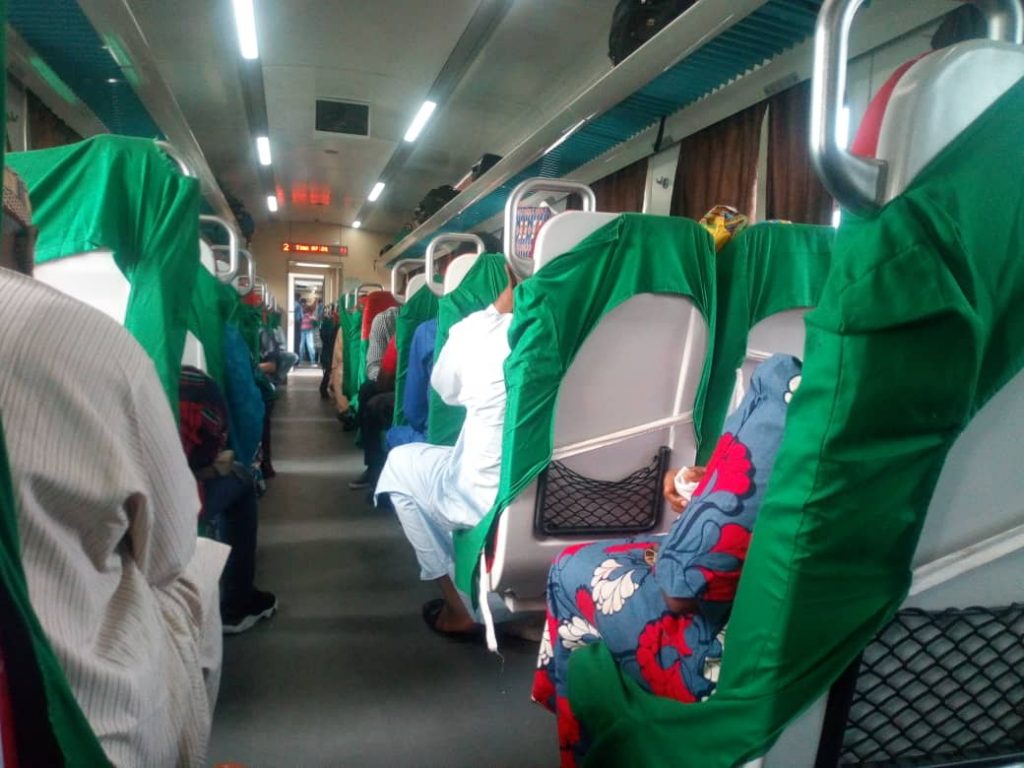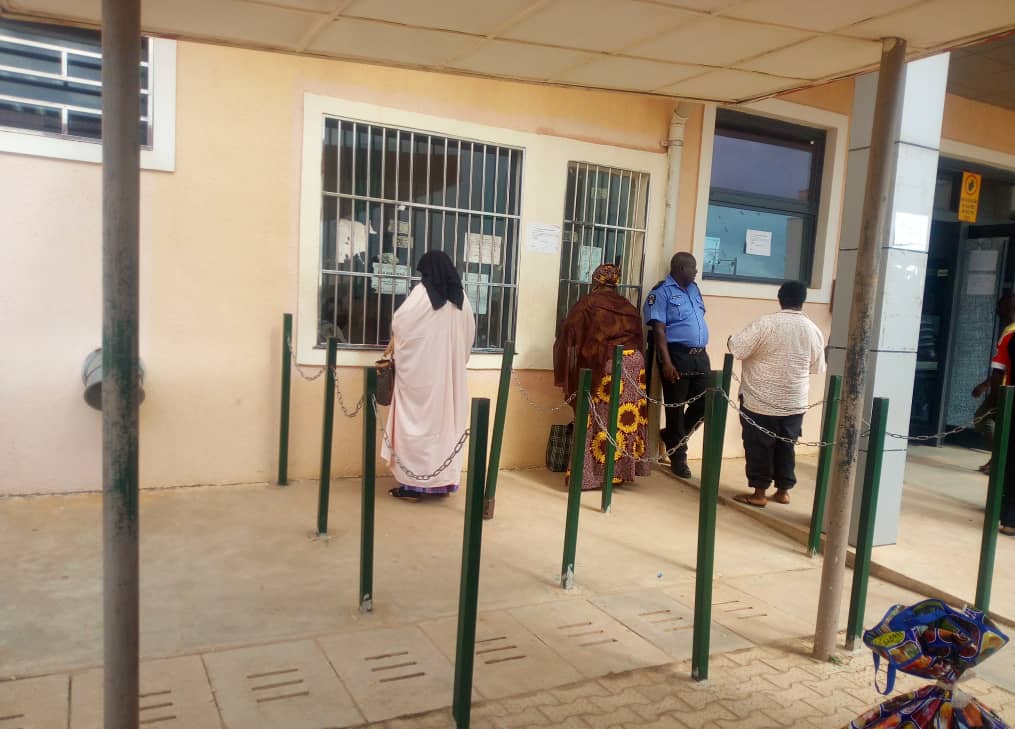Travellers queuing to board the train
Walid Kisumu had set out for the day’s business with plans to get to Abuja with the 10:35am train from the Rigasa station in Kaduna. Unfortunately, things did not go as planned and he ended up not meeting up with the sale of tickets for the trip. The time was still 10:20am and waiting for the next trip – at 2pm – was definitely not an option.
“I was told the only thing I can do is to return around 12pm to get ticket for the 2 o’clock trip. I didn’t know to go about the whole thing and I wasn’t considering travelling,” he told TheCable. “I was still close to the ticketing point trying to figure out what next for me when someone signalled for me to come. He later turned out to be a Godsent … offered to sell me his ticket although at a higher price.”

Godsent sounds like a perfect description but here is the real deal: Kisumu’s ‘saviour’ is just one of the ‘touts’ being used to swindle unsuspecting travellers at the train station – and this happened for a long time.
TICKET RACKETEERING AT THE RIGASA STATION
Advertisement
The Abuja-Kaduna rail line was one of the first standard gauge railway modernisation projects in the country. The rail project constructed by the administration of former President Goodluck Jonathan covers a distance of 186km, connecting the federal capital territory to Kaduna. The main station in Kaduna is as at Rigasa.
TheCable gathered that on days with high influx of travellers, some members of staff at the station usually connive with some locals to defraud unsuspecting travellers by selling the tickets to the locals who in turn sell to those in need of them at a higher rate, in the guise of helping them.

A regular traveller told TheCable that the practice used to be common on Sundays when – before now – there were only two trips as against the normal four trips.
Advertisement
“What happens is when there is serious traffic on Sundays, maybe people will be stranded and won’t be able to buy the ticket early, what they now do is they sell the tickets up to a certain point and draft some to some persons around the area, I think it is in conjunction with the officials,” he said.
“Those people will now hang around there. When you come, seeing that you can’t buy ticket, they will say ‘okay, if you want ticket, I have one I can assist you with’. So they now begin to sell their own to those people who are stranded and from what we gathered, they add as much as N2,000, N3,000 to the usual price.”
Another passenger who gave his name as Nathaniel said on some occasions, the tickets would be sold for just “about 20 minutes before the touts will take over.”
Every day, the train embarks on four trips shuttling to and fro Kaduna and Abuja – at 6:40am, 10:35am, 2pm and 6pm – with the exception of Wednesday (initially Sunday) which has only two trips.
When TheCable visited the station, it was discovered that sale of ticket for trip starts two hours before departure time.
Advertisement
“Sometimes, there could be rush of passengers, so we usually start early,” one of the ticket sellers who did not want her name disclosed told TheCable. “For some persons, we usually advise them to request someone to buy the tickets for them in case they won’t be able to come very early.”
‘CUT FOR THE OGAS’
One of the locals confessed that he “used to be involved” in the underhand dealings.
“Things have changed now,” he said in Hausa, adding: “There was agitation from some travellers so the management is keeping a close eye on things.”
Advertisement
Seen hawking wares not far from the station entrance, the local who chose not to disclose his name, however, denied they were robbing the passengers. “We were not stealing from them … no, we were selling at a higher price to make gain. And there is usually some cut for the ogas.” Upon further inquiry, he said the “ogas” refer to some members of the staff that are aware of the practice.
HOW THE ‘TOUTS’ OPERATE
Advertisement
Between the moment the sale of the ticket would start, some locals suspected to be the ones being used to dupe unsuspecting travellers would hang around the station, with some posing as as if they were selling their wares or helping individuals with their luggage. A good number of them would stay in groups, having discussions and sitting around for as long as two hours.
Interestingly, they would all disperse immediately the train departs only to converge again as the sale of tickets for the next trip commences.
Advertisement
TheCable reporter approached one of the locals as a willing recruit into the ‘business’ but the man denied knowledge of what the reporter was talking about. It was a similar situation with two other individuals but a traveller finally offered a useful hint.
“This kind of thing isn’t something you can just break into. As you can see, many of them if not all are from here. I think it would require getting to make friends with some of them before you are allowed into their circle,” the passenger who gave his name as Imam said.
Advertisement

DAY ANGRY TRAVELLERS PROTESTED
It did not take so long before the passengers “got fed up” with the illegal practice and they revolted at the Rigasa station. It was on a Sunday, August 5, precisely; passengers were arriving for the second and last trip of the day scheduled for 4pm – but the tickets were said to have been sold for only 10 minutes. “Sold out” became the word. Amid the frustration, the ‘touts’ were already doing what they know how best – helping stranded passengers with tickets at higher cost, a development that sparked off protest at the station.
A Kaduna resident who witnessed the incident recalled: “What transpired was that as usual, many people couldn’t get tickets while some people were selling it somewhere else apart from the normal ticketing point. That was why some started raising alarm and many people started protesting. For some time, activities were grounded at the station.”
The protesters were said to have formed a human shield preventing entry into the departure area of the station, thus delaying the next trip. The passengers had insisted that rather than the usual sale of tickets, the station manager must allow everyone to board the train while the fare would be collected manually at the commencement of the trip.
It took the intervention of some soldiers for the situation to be brought under control.
SEEKING SOLUTIONS
It was after the protest that the station management made adjustments in the daily schedule, switching Sundays for Wednesdays with Sunday having four trips while the week day having two.
“After that day (of the protest), I heard the management vowed to address the situation and stop the illegal practice,” the resident added.
Some other passengers who spoke to TheCable said to ensure transparency, tickets should be strictly sold online.
“When anyone wants to travel, the person should just log on to their website and book a ticket. That way, no one is going to come and be buying ticket here and it will even save their (the station staff) energy and our time,” the passenger said, choosing not to disclose his name.
OFFICIALS KEEP MUM
The train officials approached to either react to the issue or direct the reporter to someone who is in the position to react, declined comment. One of the officials seen close to the entrance told the reporter – on the condition of anonymity – “the management is making efforts to stop the practice”.
“The protest did not go down well with the management, so it is a serious crime now if you are caught,” he said.
TheCable reached out to the ministry of transportation for comments but neither the spokesperson for the ministry nor that of Rotimi Amaechi, transportation minister, had responded as of the time this report was filed.
A source within the ministry, however, told TheCable that Amaechi got wind of the illegal practice and summoned the station manager over it. “We were at the minister’s office when he called the man in charge and gave him a stern warning over the issue,” the source said.
Add a comment







